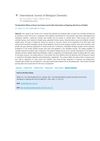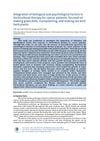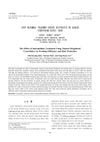
Green tea extract helped heal rabbit skin burns better than antibiotic ointment.
 20 citations,
February 2013 in “Nutrition”
20 citations,
February 2013 in “Nutrition” Selenium-enriched green tea might be a safe prebiotic for gut health.
 October 2022 in “Amplla Editora eBooks”
October 2022 in “Amplla Editora eBooks” Pre-natal, internal, and external factors may contribute to the development of Autism Spectrum Disorder (ASD).
 July 2019 in “Acta horticulturae”
July 2019 in “Acta horticulturae” Horticultural therapy helped cancer patients feel hopeful and positive about their disease experience.
 2 citations,
January 2012 in “International Journal of Trichology”
2 citations,
January 2012 in “International Journal of Trichology” Coffee and tea might help hair growth in balding individuals, but side effects and alternative uses are being considered.
 2 citations,
July 2011 in “Journal of the Egyptian Women's Dermatologic Society (Print)”
2 citations,
July 2011 in “Journal of the Egyptian Women's Dermatologic Society (Print)” Eating nuts, chocolate candy, and red tea might worsen acne, while eating more fresh vegetables could reduce it.

Drinking sweetened tea and soda and poor sleep may increase the risk of hair loss in women.
 August 2021 in “Han'gug miyong haghoeji/Journal of the Korean society of cosmetology”
August 2021 in “Han'gug miyong haghoeji/Journal of the Korean society of cosmetology” Using natural polyphenol cross-linkers like tannic acid and green tea extract in perm treatments improves curling and protects hair.
 February 2020 in “International research journal of pharmacy”
February 2020 in “International research journal of pharmacy” The emulsion made from tea plant and onion extracts shows promise for treating hair loss.
 16 citations,
January 2016 in “Annals of Dermatology”
16 citations,
January 2016 in “Annals of Dermatology” Green tea component EGCG may help prevent hair loss by changing microRNA levels in certain scalp cells.
 14 citations,
June 2018 in “Frontiers in pharmacology”
14 citations,
June 2018 in “Frontiers in pharmacology” Green tea compound EGCG helps mink hair follicles grow by affecting certain cell growth pathways.
6 citations,
December 2014 in “PubMed” A supplement for hair loss with green tea in it may cause liver problems.
 6 citations,
May 2009 in “Cell transplantation”
6 citations,
May 2009 in “Cell transplantation” Green tea component EGCG helps keep rat skin grafts viable longer.
5 citations,
September 2019 in “Medical Sains Jurnal Ilmiah Kefarmasian” The gel with green tea and gotukola may help hair growth.
 4 citations,
March 2012 in “Annals of oncology”
4 citations,
March 2012 in “Annals of oncology” New treatment with green tea polyphenols and nicotinamide improves skin problems from cancer therapy.
 3 citations,
January 2018 in “Biomedical dermatology”
3 citations,
January 2018 in “Biomedical dermatology” Green tea extract helps prevent cell death and supports cell survival in hair cells exposed to a chemotherapy drug.
2 citations,
April 2016 in “Pharmaciana” Green tea and gotukola extract mix helps hair grow, with the best results from 5% green tea and 2.5% gotukola.
Low-temperature extracts of black beans, peony, and green tea improve scalp health and are better than traditional hot-water extracts.

Drinking sweetened tea and poor sleep habits may increase the risk of hair loss in women.

Drinking sweetened tea and poor sleep increase the risk of hair loss in women.

Drinking sweetened tea and poor sleep habits increase the risk of hair loss in women.

Drinking sweetened tea and late bedtimes increase the risk of hair loss in women.

Drinking sweetened tea and late bedtimes increase the risk of hair loss in women.
May 2024 in “Jurnal Penelitian Farmasi dan Herbal” Green tea leaf extract at 7.5% concentration effectively promotes hair growth, similar to minoxidil.

Bee pollen, green tea, essential oils, and various plant extracts improve skin and hair health.
 December 2022 in “Korean journal of medicinal crop science/Han-gug yagyong jagmul hag-hoeji”
December 2022 in “Korean journal of medicinal crop science/Han-gug yagyong jagmul hag-hoeji” Natural extracts like ginseng, green tea, shiitake, and aloe vera may help prevent hair loss by protecting hair-related cells.
Green tea extract may be more effective and safer than minoxidil for hair growth.
December 2015 in “아시안뷰티화장품학술지” Green tea's EGCG has various health benefits, including antioxidant properties, skin protection, cancer cell growth inhibition, anti-inflammatory effects, fat breakdown, detoxification, diabetes management, hair growth stimulation, and prevention of gum disease.
August 2011 in “동의생리병리학회지 = Journal of physiology & pathology in Korean Medicine” Green tea extract increases lipid production in human sebaceous gland cells.





















